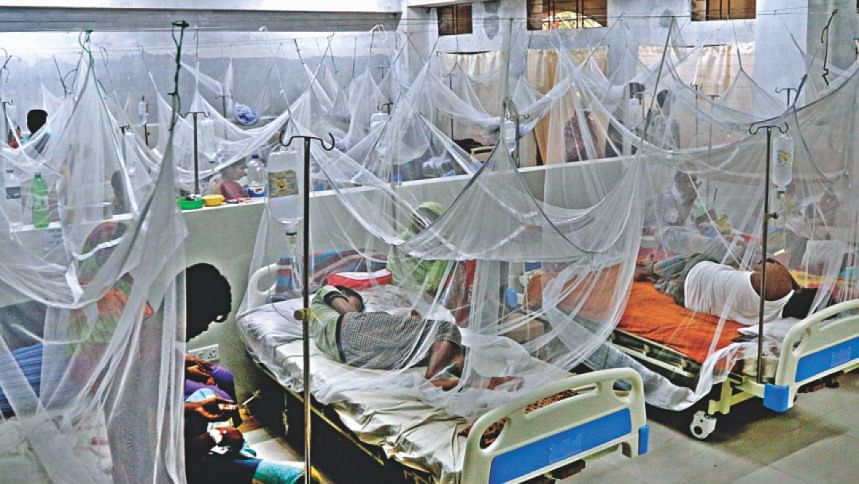Dengue cases shot up in June

From May to June this year, cases have increased by over four times, and it will start rising by 10 times, which will continue till September or October if proper measures are not taken.
A total of 737 people was infected with dengue in June. In the past five years, June has not witnessed so many cases except in 2019, one of the worst years in regards to dengue infections.
This year, the number of cases was 163 in May, 23 in April, 20 in March and February, while it was 126 in January, according to Directorate General of Health Services (DGHS).
Experts urged authorities to take immediate measures to control infections by identifying hotspots.
They also underscored the need for building awareness among people, as Aedes mosquitoes, carriers of the dengue virus, breed in clean water.
According to DGHS, dengue cases in June were 267 in 2017, 295 in 2018, 1,884 in 2019, 20 in 2020, and 272 in 2021.
Normally, in the dengue season's first two or three months, cases start multiplying by three to four times. But after that, it increases by 10 times or more, and this trend continues for the next few months, said GM Saifur Rahman, an entomologist at Bangladesh National University.
From May to June this year, cases have increased by over four times, and it will start rising by 10 times, which will continue till September or October if proper measures are not taken, said Saifur.
DGHS data show that in 2019, the year when cases crossed one lakh, there were 1,884 infections in June, and that number rose to 16,253 in July and 52,636 in August.
Entomologists have repeatedly urged authorities to determine locations prone to dengue infection and let everyone know, so that people can be aware, arrange for personal protection, and take area-based measures. But local authorities often deny that cases are originating from their areas, he said.
There is a blame game going on between authorities concerned, which indicates their lack of sincerity, Saifur said.
Prof Kabirul Bashar, entomologist of Jahangirnagar University, said addressing the source of infections is crucial to control Aedes mosquitoes, and for this, raising awareness among people is essential. Ward councillors can play a vital role, as they can conduct drives with locals in every house. So, every councillor will have to be proactive, as central administration will not be able to do this alone, he said.
Dr Md Ekramul Haque, deputy programme manager of malaria and ATD control programme at DGHS, said to control Aedes mosquitoes, an integrated initiative, especially involving locals, is crucial.
"We have already directed to open 'dengue corners' at all district and upazila hospitals and special wards at medical college hospitals," he said.
He said they have a sufficient number of kits to identify dengue patients. "We have already trained both doctors and nurses to treat dengue."
Dhaka South City Corporation Chief Health Officer Dr Fazle Shamsul Kabir on Wednesday said apart from their regular anti-mosquito drive and awareness campaign, they are conducting drives inside the 300-yard radius of patients.
Apart from their regular drive, Dhaka North City Corporation will tomorrow inaugurate a ten-day operation to find Aedes-mosquito breeding grounds on rooftops or in balconies using drones.

 For all latest news, follow The Daily Star's Google News channel.
For all latest news, follow The Daily Star's Google News channel. 



Comments